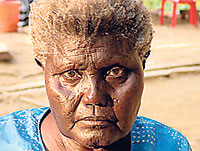The last speaker of an ancient tribal language has died in the Andaman Islands, breaking a 65,000-year link to one of the world's oldest cultures.
Boa Sr, who lived through the 2004 tsunami, the Japanese occupation and diseases brought by British settlers, was the last native of the island chain who was fluent in Bo.
Taking its name from a now-extinct tribe, Bo is one of the 10 Great Andamanese languages, which are thought to date back to pre-Neolithic human settlement of south-east Asia.
Though the language has been closely studied by researchers of linguistic history, Boa Sr spent the last few years of her life unable to converse with anyone in her mother tongue.
Even members of inter-related tribes were unable to comprehend the repertoire of Bo songs and stories uttered by the woman in her 80s, who also spoke Hindi and another local language.
"Her loss is not just the loss of the Great Andamanese community, it is a loss of several disciplines of studies put together, including anthropology, linguistics, history, psychology, and biology," Narayan Choudhary, a linguist of Jawaharlal Nehru University who was part of an Andaman research team, wrote on his webpage.
"To me, Boa Sr epitomised a totality of humanity in all its hues and with a richness that is not to be found anywhere else."
The Andaman Islands, in the Bay of Bengal, are governed by India. The indigenous population has steadily collapsed since the island chain was colonised by British settlers in 1858 and used for most of the following 100 years as a colonial penal colony.
Tribes on some islands retained their distinct culture by dwelling deep in the forests and rebuffing would-be colonisers, missionaries and documentary makers with volleys of arrows. But the last vestiges of remoteness ended with the construction of trunk roads from the 1970s.
According to the NGO Survival International, the number of Great Andamanese has declined in the past 150 years from about 5,000 to 52. Alcoholism is rife among the survivors.
"The Great Andamanese were first massacred, then all but wiped out by paternalistic policies which left them ravaged by epidemics of disease, and robbed of their land and independence," said Survival International's director, Stephen Corry.
Courtesy guardian.co.uk |


